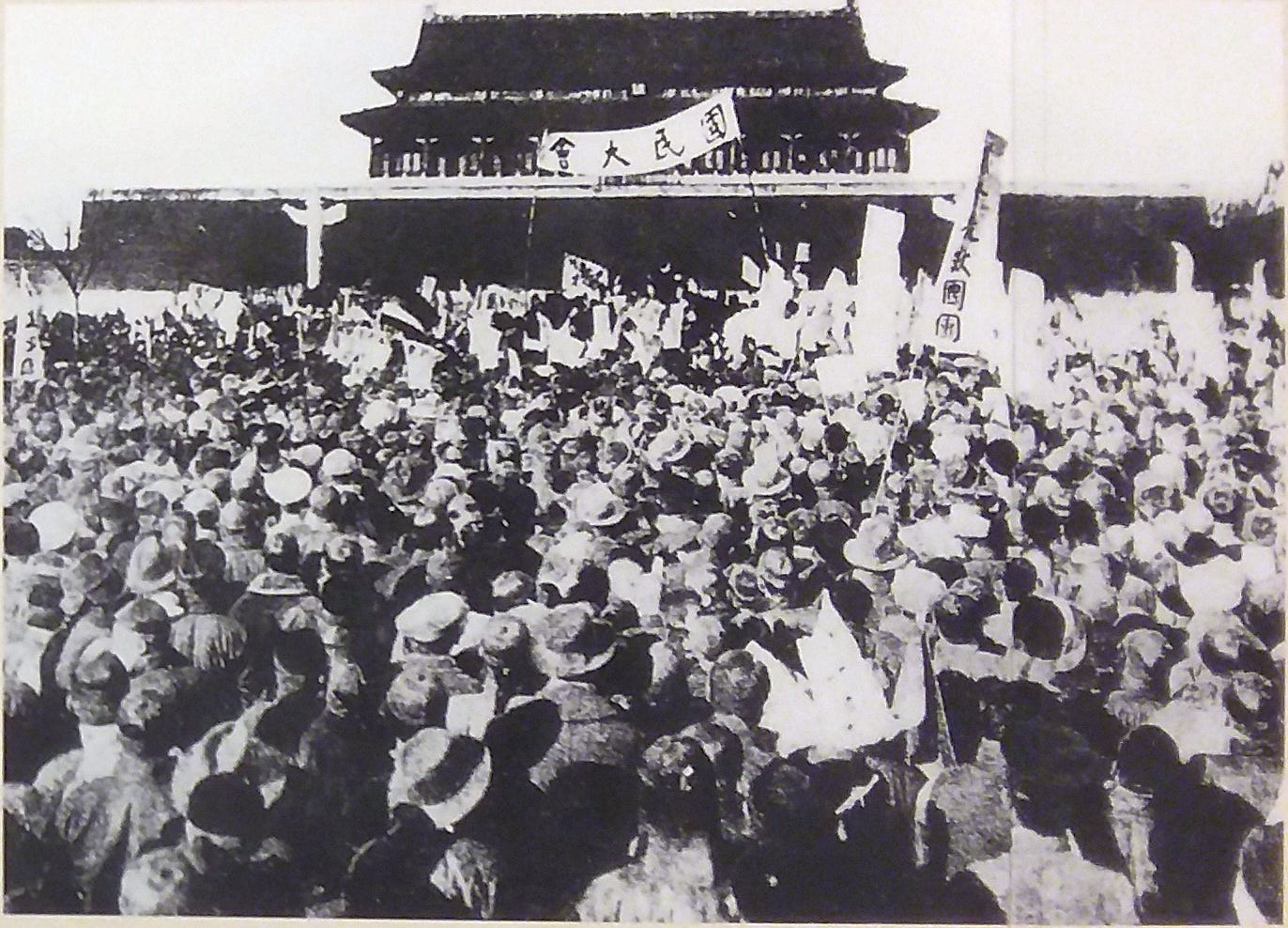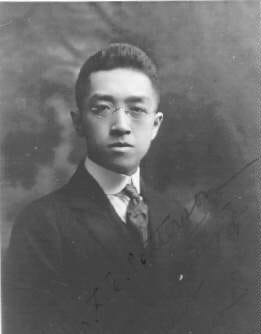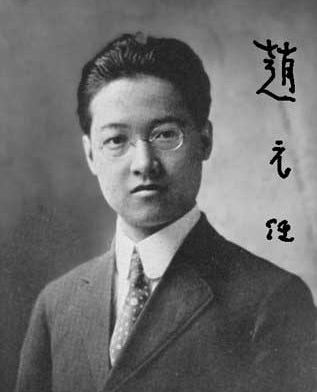Episode V: The Reform. From Rebellion to Reform: the Boxer Indemnity Scholarship Program
The Boxer Indemnity's role in sparking the May Fourth Movement and a path to reform
In our previous episode, we discussed how the Boxer Indemnity Scholarship Program graduates brought modern disciplines and technologies back to China upon completing their studies in the United States. However, the graduates’ contributions extended far beyond technical knowledge—their exposure to Western values also inspired efforts to introduce cultural and institutional reforms.
Perhaps one of the most influential reformers among the graduates was 胡適 (Hu Shi). In 1910, Hu Shi attended Cornell University to study agriculture before switching his major to philosophy and literature. After acquiring an undergraduate degree under John Dewey, Hu studied philosophy at Columbia University before returning to China in 1917.
Soon after returning, Hu became a leading figure in China’s New Culture Movement. He advocated for vernacular Chinese as the national language and called for replacing classical Chinese with a modern writing style. In his 1917 essay “Preliminary Discussion on Literary Reform,” Hu argued that simplifying the language would make education and knowledge accessible to the broader population.
According to an anecdote, while dining at a restaurant, Hu Shi noticed the menu was written in complex classical Chinese that many customers struggled to read. He suggested the owner rewrite it in plain vernacular. Skeptical at first, the owner agreed to give it a try and discovered that the simplified menu significantly increased his restaurant’s revenue. Reflecting on this story, Hu Shi later remarked, “People prefer food they can order without a dictionary.”
Another scholar, 趙元任 (Zhao Yuanren), also greatly influenced the development of vernacular Chinese. Zhao attended Cornell and later Harvard as a student from 1910 to 1918. Zhao was Hu Shi’s classmate at Cornell and later his lifelong friend. After receiving a PhD in philosophy from Harvard, Zhao returned to China in 1920, becoming a mathematics professor at Tsinghua University. A brilliant linguist, Zhao invented the General Chinese phonetic system to represent the pronunciations of different varieties of Chinese.
In addition to linguistic reform, Hu Shi advocated for applying scientific methods in social and political reforms, urging intellectuals to focus on solving real-world problems rather than clinging to dogma. Hu criticized traditional Confucian values as outdated, advocating for a culture rooted in individualism, democracy, and modern science.
Hu Shi’s insistence on pragmatism and gradual reform played a crucial role in the May Fourth Movement of 1919, including its emphasis on rationality and evidence-based approaches. This cultural and political movement is often seen as a direct result of the intellectual awakening fostered by students who have been either directly or indirectly exposed to Western education. Sparked by China’s perceived betrayal in the Treaty of Versailles, which handed Chinese territories to Japan, the movement expanded to question traditional values and demand political reform.

Specifically, protestors in the movement hoped to address and improve three main aspects of Chinese society: education, language, and politics. First, protestors promoted educational reform, advocating for modern, secular, and scientific education to replace conventional Confucian teachings. In addition, protestors promoted using vernacular Chinese, which Hu Shi and Zhao Yuanren had popularized, instead of classical Chinese, believing the former would make education and literature more accessible. Finally, protestors demanded change in the government, calling for stronger national sovereignty, democratic governance, and social equality.
Within the leadership of the May Fourth Movement, Hu Shi and Chen Duxiu, another leader of the Movement and intellectual figure of the time, shared a complicated but respectful relationship. Chen, who co-founded the Chinese Communist Party, often criticized Hu Shi’s gradualist approach to reform. Hu Shi responded to the criticism noting “A steady fire cooks the rice better than a roaring flame.” This metaphor encapsulated Hu Shi’s belief in gradual, pragmatic change as opposed to abrupt revolution.
Looking at the broader period of 1908-1930, the graph below depicts the trends in the Boxer Indemnity scholarship program and domestic advocacy for freedom and democracy. The graph shows that the number of students participating in the scholarship program was highly correlated (64%) with the mention of the words “America,” “freedom,” and “democracy” in Chinese newspapers. Although more rigorous analysis is needed to examine a causal effect, this close correspondence reflects the simultaneous rise in a generation of students exposed to Western thoughts and the shifts in China’s intellectual space.
While the Boxer Indemnity Scholars brought transformative ideas that led to the movement, their influence was not without resistance. Conservative factions in China viewed Western ideas as a threat to traditional values, and the scholars often faced criticism for being “Westernized” or disconnected from China’s realities.
Additionally, the program’s benefits were primarily limited to urban elites, leaving rural areas and the vast majority of the population aside. Most scholarship recipients came from urban, affluent families who could afford the preparatory education required to qualify. While the program produced a generation of intellectuals, it failed to address mass illiteracy and the lack of primary education. This disparity later led to criticism of the intellectual class and demands for more inclusive reforms.
Despite its limitations, the Boxer Indemnity Scholarship Program highlighted the potential of education as a tool for diplomacy and development. The challenges faced by Boxer scholars in reconciling Western ideas with Chinese realities underscored the complexities of reform in a society grappling with tradition and modernity.
“Boxer indemnity is a mark of national humiliation, but the Boxer indemnity students who studied in the U.S. played an important role in China’s path to a modern country.”
-- Beijing Youth Daily, April 30, 2001
The program also significantly influenced later models of education diplomacy. Drawing on the precedent set by the Boxer Indemnity Scholarship, Senator William Fulbright established the Fulbright Program, which became America's flagship educational exchange diplomacy effort.
“I might say that one of the precedents, one of the reasons why the first agreement under the [Fulbright Act] legislation was with China, was the Boxer Indemnity precedent.”
-- Senator William Fulbright
"With the world divided into two competing ideological camps, it has been apparent for many years that the only real solution to the stalemate that confronts mankind lies in greater mutual understanding among nations. The threat of war, with its disastrous implications in the nuclear age, must be attacked at its source—in the hatred, ignorance, and prejudice that separate peoples everywhere.”
-- Board of Foreign Scholarships, 1959.
To date, the legacy of the Boxer Indemnity Program lives on through the students it educated and the institutions it helped establish. By funding scholarships and creating opportunities for intellectual growth, the program directly contributed to China’s modernization and the spread of new ideas in language, science, and governance. It also highlighted how diplomacy, even when arising from episodes of conflicts, can lead to lasting reforms that transcend borders.
Thank you once again for reading my articles! Hope you enjoyed this series on the Boxer Indemnity Scholarship Program. See you next time!
- Ethan






